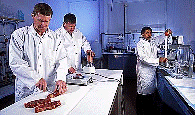United States Department of Agriculture: Agricultural Research Service, Lincoln, Nebraska

Roman L. Hruska U.S. Meat Animal Research Center: Reports
Date of this Version
2014
Document Type
Article
Citation
Meat Science 98 (2014) 372–382
Abstract
Significant effort has been targeted at reducing the risk of pathogens in U.S. beef products since the mid-1990s. These efforts were focused on Escherichia coli O157:H7 after it was declared an adulterant in ground beef or its components. Post-harvest interventions applied to hides and carcasses by beef processors resulted in significant progress. Effective pre-harvest approaches proved hard to identify and implement. Six additional pathogenic E. coli serogroups were made adulterants in some beef products in 2012 and discussion regarding Salmonella is ongoing. Success to date has resulted from the combination of regulatory, research, and industry efforts to reduce the presence of pathogens in beef.


Comments
U.S. Government Work